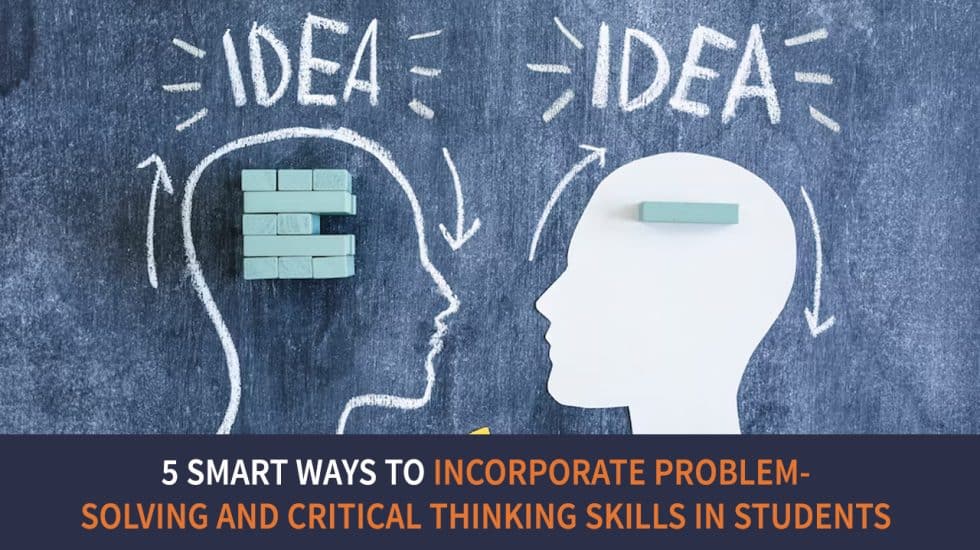5 Smart Ways to Incorporate Problem-Solving and Critical Thinking Skills in Students

Critical thinking is the ability to think clearly and logically by understanding the connection between ideas, events, processes, cause and result, and actions and consequences. It is an important life skill to master. Combined with a creative aptitude and a problem-solving attitude, it can transform the student into an informed learner, a socially aware person, and an innovator with leadership potential. Within the academic domains, students who think critically and can solve problems are hungry to learn and grow their intellectual quotient. They are strong decision-makers, think outside the box to come up with innovative ideas, are organized, focused and ready to thrive. So here are five smart ways to incorporate problem-solving and critical thinking skills in students:
1. Encourage Active Learning
Students must be active learners to develop critical thinking skills. If they study a concept in haste, they will not think deeply about it or link it with what they already know. Critical thinking is crucial to analyze information and delve deeper into the subject. Therefore critical thinking skills for students are best developed when theoretical learning is combined with real-life experiences. If this is done frequently in the classroom and at home, students will become active learners with strong critical thinking skills. MIT Gurukul, one of the best schools in Pune, believes in providing experiential learning opportunities to its students.
2. Use Real-World Problems and Scenarios
When students are encouraged to look at real-world problems that impact their immediate surroundings, they enhance their ability to understand the related cultural, geographical, regional, legal and socio-psychological aspects. They also deliberate and come up with solutions and thus become adept at leading and managing situations in their higher education and professional years. At MIT Gurukul, one of the best schools in Pune, we bring opportunities for our students to find connections in their learning. Students are encouraged to find associations between different subject elements and real-life situations that match the topic. It takes their minds out of the four walls of a classroom and teaches them to look at the outside world. They become better global citizens and impactful leaders in the process.
3. Foster Independent Thinking and Exploration
Grow the seed of hunger in the minds of your children and you will see wonders! Asking open ended questions that require the students to think up the answer rather than just say yes or no helps them to exercise their thought process, logical analysis and critical thinking. MIT Gurukul, one of the best schools in Pune, encourages students to ask meaningful questions on their own too within our classes, especially as they reach our middle years program and progress to the senior years. To foster their independent thinking and exploration, we often ask them some of these questions:
- Could you give me an example to support your answer?
- Could you elaborate further on that point?
- Do we need to consider another point of view here?
- Will you provide some more details?
- Is there another way we can approach solving this issue?
4. Teach Problem-Solving Strategies
If a student develops problem-solving skills at a young age, they will bring out the best in every opportunity. It will equip them with confidence, intelligence and perseverance. You can give your students a hypothetical problem and ask them to find solutions through critical and creative thinking. Here are a few examples that may come in handy, and many of which we utilize at MIT Gurukul for interaction with our students within the classroom settings:
- You have two important assignments and both are due next week. How will you make sure to complete both?
- Your friend has failed an exam. How do you support them?
- Your city is getting polluted day by day. Suggest some measures you can take starting from your home to help solve this environmental problem.
5. Encourage Group Work and Collaboration
Group work and collaboration can build skills of leadership, cooperation, empathy and inclusion in the young minds; and nurture such qualities as the students grow older. Some of the ways to foster group work are debates, team based quizzes, group projects and presentations, buddy programs, volunteering and organizing events in teams. In the classroom, a teacher may give a debate topic to the students and divide them into two groups, one for the notion and the other against it. The topic may be based on a new scientific discovery, current affairs, use of art for expressing emotions or ideas, moral dilemma, political situation, or a groundbreaking technological development. MIT Gurukul, being one of the top ICSE schools in India, allows students to bring their ideas to the table, discuss with each other and get introduced to fresh perspectives. Assigning an impromptu creative project is another interesting way to develop team spirit and problem-solving skills.
As we reach the end of this article, we cannot reiterate enough the importance of critical thinking and problem-solving skills for students in the classroom and beyond. We urge the parents to also encourage these qualities amongst their wards and encourage and support them through positive reinforcement as they traverse their journey to hone their ability for thinking critically, asking questions, and to never stop learning. We urge and request parents to incorporate activities in their child’s daily routine that help them develop critical thinking, leadership qualities and the skill to solve problems.

